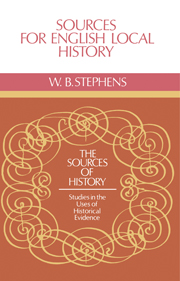Book contents
- Frontmatter
- Contents
- General editor's introduction
- Preface to the second edition
- Preface to the first edition
- Abbreviations
- 1 Introduction
- 2 Population and social structure
- 3 Local government and politics
- 4 Poor relief, charities, prices and wages
- 5 Industry, trade, and communications
- 6 Agriculture
- 7 Education
- 8 Religion
- 9 Houses, housing, and health
- Index
- Frontmatter
- Contents
- General editor's introduction
- Preface to the second edition
- Preface to the first edition
- Abbreviations
- 1 Introduction
- 2 Population and social structure
- 3 Local government and politics
- 4 Poor relief, charities, prices and wages
- 5 Industry, trade, and communications
- 6 Agriculture
- 7 Education
- 8 Religion
- 9 Houses, housing, and health
- Index
Summary
This chapter deals successively with sources for the history of the Church in and of England, of Protestant nonconformity, and of Roman Catholicism. Those who seek to deal at a local level with the history of the Church will find the path well trodden and for that reason it has been possible to deal with it here more briefly than might otherwise have been the case.
THE CHURCH
Over the centuries the essential local ecclesiastical unit has remained the parish and it is the church history of parishes, which, therefore, often forms our main object of investigation. For places covered in the topographical volumes of the Victoria History of the Counties of England the essential outlines will be available in print, and other parishes may also have respectable histories. Where this is not so the local historian will have the task of discovering what he can of the church as a building, of the incumbents and patrons, and of the spiritual life of the parish community both before and after the Reformation. On these topics, except the spiritual life, much will be found in the books of the older topographers, though strict accuracy there should certainly not be assumed.
In his investigation the parochial historian will need to establish whether the incumbent was a vicar or a rector. Originally the parish priest was its rector (parson), but during the Middle Ages many rectories were appropriated by monastic houses which enjoyed the rectorial revenue and appointed vicars (clerical deputies) to carry out the parochial duties.
- Type
- Chapter
- Information
- Sources for English Local History , pp. 248 - 296Publisher: Cambridge University PressPrint publication year: 1981

